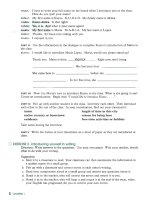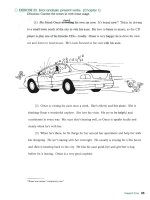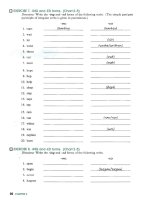Fundamentals of english grammar third edition part 32 pot
Bạn đang xem bản rút gọn của tài liệu. Xem và tải ngay bản đầy đủ của tài liệu tại đây (418.47 KB, 7 trang )
Switch roles.
3.
A.
My roommate snores really loudly. I'm losing sleep. I don't know what to do.
B:
~a~be
you should.
. . .
A:
I've thought of that, but
. . . .
B:
Well then,
maybe
you'd
better
.
.
.
.
A:
Maybe. I guess I really ought to
. . . .
B: That's a good idea.
4.
A:
The refrigerator in my apartment doesn't work. The air conditioner makes so
much noise that
I
can't sleep. And there
are
cockoaches in the kitchen.
B: Why do you stay there? You should.
. . .
A:
I can't. I signed a lease.
B: Oh. That's too bad. Well, if you have to stay there, you'd
better
.
. . .
;.
,
A:
I suppose I should do
that.
:%.';
B:
And you also ought to
. .
. .
.1.
.
I
.
.,
:
:.
.
,
2
':
rtc
.
.
;.
.
,
'
.
1
2.
EXERCISE
22.
Glvlng advice.
(charts
7-7
and
7-8)
DirecEionr:
Give advice using should, ought to, and had
better.
Work in groups of four.
Only Speaker A's book is open. Rotate the open book, using a new Speaker A for each
item.
Example:
SPBAKBR
A
(book open):
I study, but I don't understand my physics class. It's the middle
of the term, and I'm failing the course.
I
need a science course
in order to graduate. What should I do?*
SPEAKER
B
(book dosed):
You'd
better
get a tutor right away.
SPEAKER
c
(bwk closed):
You should make an appointment
with
your teacher and see if
you can get some extra help.
SPEAKER
D
(book closed):
Maybe you ought to drop your physics course and enroll in a
diierent science course next term.
1.
I forgot my dad's birthday yesterday.
I
feel terrible about it.
What
should I do?
2.
I just discovered that I made dinner plans for tonight with two diierent people. I'm
supposed to meet my fiancbehance at one restaurant at 7:00, and I'm supposed to
meet my boss at a different restaurant across town at 8:OO. What should I do?
3.
The boss wants me to finish my report before I go on vacation, but I don't have time. I
might lose my job
if
I don't give
him
that report on time. What should
I
do?
4.
I borrowed Karen's favorite book of poems. It was special to her. A note on the inside
cover said "To Karen." The poet's signature was at the bottom of the note. Now I
can't find the book. I think I lost it. What am I going to do?
*Should
(not
ought
w
or
hod
bear)
is
usually
used
in
s
question that
eska
for
advice.
The answer,
however,
can
conrain
should, ought
w,
or
hod
kaar.
For
example:
A:
My
hou~rphm
oluxEys
die. What
should
I
do?
B:
Bull
betterm
n
book
on
plum
Xu
should
ny
w
find
out
why
thsy dis.
Maybeym
ought
to
[ook
on
rhr
Inrsrnn
and
sa
#you
canw
rome
i&rm&n
Modal
Auxlllarles
205
EXERCISE
23.
Giving advice. (Charts
7-7
and
7-8)
Directions: Discuss problems and give advice. Work in groups.
Speaker
A:
Think of a problem in your life or a fiend's life. Tell your classmates about
the problem and then ask them for advice.
Group: Give Speaker
A
some advice. Use
shouldlought tolhad
better.
Example:
SPEAKER
A:
I
can't study at night because the dorm is too noisy. What should
I
do?
SPEAKER
B:
YOU ought to study at the library.
SPEAKER
C:
YOU shouldn't stay in your dorm room in the evening.
SPEAKER
D:
You'd better get some ear plugs.
SPEAKER
E:
E~c.
7-9
EXPRESSING
NECESSITY: HAVE
TO,
HAVE
GOT TO,
1
MUST
haw
to
I
I
haw
got to
study tonight.
&
1
@)
I'd like to go with you to the movie this
evening, but
I
can't. I
haw
to go
to a
meeting.
(c) Bye now!
I'w
got to go.
My wife's waiting
for me. I'll call you later.
(d)
AU
passengers
muut present
their passports
at customs upon arrival.
(e)
Do
we
have
to bring
pencils to the test?
(f)
Why
did
he
haw
to
Ieaw
so early?
(g)
I
had
to
study last night.
@)
I
haw
to
("hafta")
go
downtown today.
(i)
Rita
has
to
("hasta")
go
to the bank.
(i)
I've
got to
(L'gotta")
snrdy
tonight.
same meaning. They express the idea that something is
necessary.
Have
to
is used much more frequently in everyday
speech and writing than
must.
Haw
got to
is typically used
in
informal conversation,
as
in
(c).
Must
is typically found
in
written instructions, as
in
(d). It is usually a strong, serious, "no nonsense" word.
QrresnoNs:
Haw
to
is usually used
in
questions, not
must
or
haw
got to.
Forms of
do
are used with
have
to
in
questions.
The
PAST
form of
haw
to,
haw
got to,
and
must
(meaning necessity) is
had
to.
Usual
PRONUNCIATION:
haw
to
=
lhreftal
OR
/ha
has
to
=
ihsestal
OR
ksd
(haw)
got to
=
Igadal
OR
/@fa/
EXERCISE
24.
HAVE TO, HAVE GOT TO,
MUST,
and SHOULD. (Charts
7-7
and
7-9)
Directions: Discuss the questions and the meanings of the auxiliaries.
1.
What are some things you have to
do
today? tomorrow? every day?
2.
What is something you had to do yesterday?
3.
What is something you've got to
do
soon?
4.
What is something you've got to do after class today or later tonight?
5.
What is something a driver must do, according to the law?
6.
What is something a driver should always do to be a safe driver?
7.
What are some things a person should
do
to stay healthy?
8.
What are some things a person must
do
to stay alive?
206
CHAPTER
7
EXERCISE
25.
Summary: expressing advice and necessity. (Charts
7-7
+
7-9)
Direen'm:
Read the passage, and then give advice either
in
a discussion group or
in
writing.
Mr. and Mrs. Hill don't know what to do about their fourteen-year-old son, Mark.
He's very intellgent but has no interest in school or in learning. His grades are getting
worse, but he won't do any homework. Sometimes he skips school without
permission, and then he writes an excuse for the school and signs his mother's name.
His older sister, Kathy, is a good student and never causes any problems at home.
Mark's parents keep asking him why he can't be more like Kathy. Kathy makes fun of
Mark's school grades and tells
him
he's stupid.
AU
Mark does when he's home
is
stay
in
his
room and listen to
very
loud music.
Sometimes he doesn't even come downstairs to eat meals with his family. He argues
with his parents whenever
they
ask him to do chores around the house, like taking out
the trash.
Mr. and
Mrs.
Hill can't stay calm when they talk to
him.
Mrs. Hill is always
yelling at her son. She nags him constantly to do his chores, clean up
his
room, finish
his homework, stand up straight, get a haircut, wash his face, and tie his shoes. Mr. Hill
is always making new rules. Some of the rules are unreasonable. For instance, one rule
Mr.
Hill made was that his son could not listen to music after five o'clock. Mark often
becomes angry and goes up to his room and slams the door shut.
This family needs a lot of advice. Tell them what changes they should make. What
should
Mr.
and Mrs. Hill do? What shouldn't they do? What about Kathy? What should
she do? And what's Mark got to do to change his life for the better?
Use each of the following words at least once
in
the advice you give:
a. should e. ought to
b. shouldn't f. have tohas to
c.
have got tohas got to
g. must
d. had better
7-10
EXPRESSING LACK OF NECESSITY:
DO NOT
HAVE
TO
I
EXPRESSING PROHIBITION:
MUST NOT
(a)
I
finished
all
of
my homework this afternoon.
I
don't
haw
to
study
tonight.
(b)
Tomorrow
is
a
holiday.
Mary
doam't
haw
to
PO
to
class.
(c)
Children,
you
must notplay
with matches!
(d)
We
must not
use
that door. The sign says
PRIVATE:
DO
NOT
ENTER.
(e)
You
mustn't
play
with
matches.
Don'tl&ssnJt
haw
to
expresses the idea that
something
is
not
necessary.
Must not
expresses
prohibition
(DO
NOT
DO
THIS!).
Must
+
not
=
mustn't.
(Note:The first
"t"
is
not
pronounced.)
Modal Auxiliaries
207
0
EXERCISE
26.
Lack of necessity (DO NOT
HAVE
TO) and prohibition (MUST NOT).
(Chart
7-1
0)
Directions:
Complete the sentences with
don'tldoesn't
have
to
or
must not.
1.
You
w&
hot
drive when you are tired. It's dangerous.
2.
I live only a few blocks fiom my office. I
Aoh't
have
to
drive to work.
3.
Liz finally got a car, so now she usually drives to work. She
take the bus.
4.
Tommy, you
say that word. It's not a nice word.
5.
Mr.
Moneybags is very rich. He
work for a living.
6.
A:
You
tell Jim about the surprise birthday party. Do
you promise?
B: I promise.
.
::
7.
According to the rules of the game, one player hit or
,
.:
A:?.,'
*
trip another player.
8.
If
you use a toll-& number, you
pay for the phone call.
9.
A:
Did Professor Adams make an assignment?
B: Yes, she assigned Chapters
4
and
6,
but we read
Chapter
5.
10.
A:
Listen carellly, Annie. If a stranger offers you a ride, you
get in the car. Never get
in
a car
with
a stranger. Do you understand?
B:
Yes, Mom.
./
12.
A: Children, your mother and I are going out this evening. I want you to be good.
-
You must do everything the baby-sitter tells you to do. You
,,
rl
go outside after dark. It's Saturday night, so you
go to bed at eight. You can stay up until eight-thirty. And remember: you
pull the cat's tail. Okay?
B: Okay, Dad.
208
CHAPTER
7
EXERCISE
27.
Summary: expressing advice, posslblllty, and necessity.
:,A,;
(Charts
7-4
and
7-7
+
7-10)
Directions:
Read about each situation and discuss it, orally or in writing.
In
your
discussion, include as many of the following expressions as possible.
,
,
,.
Example:
C
-
should, shouldn't
hawe to, not have to
ought to
have got
to,
nor haw
to
had better, had better not must, must not
could
:arol is just recovering from the flu. She's at work today. She works for a big
company. It's her 6rst day back to work since she got ill. She tires easily and
feels a little dizzy.
SPEAKER
A:
Carol
ought to
talk to her supervisor about leaving work early today.
SPEAKER
B:
I
think Carol
should
go directly home from work, no matter what her boss
says. She's
got to
take care of her health.
SPEAKER
C:
I
agree. She
doesn't
have
to
stay at work
if
she doesn't feel well, and she
shouldn't.
SPEAKER
D:
She
could
explain to her boss that she doesn't feel well yet and see what her
boss says.
SPEAKER
E:
I think she
should stay
at work until quitting time. If she was well enough to
come to work, she's well enough to work a full day. Etc.
I
1.
Steve is a biology major. Chemistry is a required course for biology majors. Steve
doesn't want to take chemistry. He would rather take a course in art history or
creative writing. His parents want him to become a doctor. He's not interested in
medicine or science. He hasn't told his parents because he doesn't want to disappoint
them.
*,.,.
.
.
. .
,.
:
:
.
v
'
,
&IF%
g!%:&&, '>&.::,
,<i,
:,,
~~*
,
.
c;
2.
Matt and Amy are eighteen years old. They are full-time students. Their parents are
supporting their education. Matt and Amy met five weeks ago. They fell in love.
Matt wants to get married next month. Amy wants to wait four years until they finish
their education. Man says he can't wait that long. Amy loves him desperately. She
thinks maybe she should change her mind and marry Matt next month because love
conquers all.
3.
Georgia has just left the supermarket. She paid for her groceries in cash. When she
got her change, the clerk made a mistake and gave her too much money. Georgia put
the extra money in
her
purse. With her ten-year-old son beside her, she walked out of
the store. Georgia needs the money and tells herself that the store won't miss it.
Nobody needs to know.
Modal Auxlllarles
209
4.
This is a story about a rabbit named Rabbit and a frog named Frog. Rabbit and Frog
are good friends, but Rabbit's family doesn't like Frog, and Frog's family doesn't like
Rabbit.
Rabbit's family says, "You shouldn't be friends with Frog. He's too different from
us. He's green and has big eyes. He looks strange. You should stay with your own
kind."
And Frog's family says, "How can you be friends with Rabbit? He's big and
clumsy. He's covered with hair and has funny ears. Don't bring Rabbit to our house.
What will the neighbors think?"
-11
MAKlNti LUtilLAL LUNLLUSIUNS:
MUSX.
(a)
A:
Nancy is yawning.
B: She
must
be
sleepy.
In (a): Speaker B is making a logical guess. He
bases his guess on the information that Nancy is
yawning. His logical condusion, his "best guess," is
that Nancy is sleepy. He uses
must
to express his
logical conclusion.
(b)
LOGICAL
CONCLUSION: Amy plays tennis every
day. She
must
like
to play tennis.
(c) NECEssIrY:
If
you want to get into the movie
theater, you
must
buy
a ticket.
(d)
NEGATIVE
LOGICAL
CONCLUSION:
Eric ate
everything on his plate except the pickle. He
must not
like
pickles.
(4 PROHIBITION: There are sharks
in
the ocean near
our hotel.
We
must not go
swimming there.
COMPARE:
Must
can exprese
I
a logical conclusion, as in
(b).
1
necessity, as
in
(c).
COMPARE:
Must not
can express
a negative logical conclusion, as in (d).
prohibition, as
in
(e).
210
CHAPTER
7
0
EXERCISE
28.
Making logical conclusions: MUST and MUST NOT. (Chart 7-1 1)
Direchns:
Make a logical conclusion about each of the following situations. Use
must.
Example:
Emily is crying.
+
She
must
be unhappy.
1.
Mrs. Chu has a big smile on her face.
2.
Nadia is coughing and sneezing.
3.
Rick is wearing a gold ring on the fourth finger of his left hand.
4.
Sam is shivering.
5.
Mr. Alvarez just bought three mouse uaps.
6.
James is sweating.
7.
Rita rents ten movies every week.
8.
Olga always gets the highest score on every test she takes.
9.
Toshi can lift one end of a compact car by himself.
EXERCISE
29.
Making logical conclusions: MUST and MUST NOT. (Chart 7-1 1)
Directions:
Complete the dialogues with
must
or
must not.
1.
A:
Did you offer our guests something to drink?
B: Yes, but they didn't want anything. They
WW~
wt
be thirsty.
2.
A:
You've been out here working in the hot sun for hours. You
wkst
be thirsty.
B: I am.
3.
A:
Adam has already eaten one sandwich. Now he's making another.
B:
He be hungry.
4.
A:
I
offered Holly something to eat, but she doesn't want anything.
B: She be hungry.
5.
A:
Brian has a red nose and has been coughing and sneezing.
B: Poor fellow. He have a cold.
6.
A.
Fido? What's wrong, old boy?
B: What's the matter with the dog?
A:
He won't eat.
B:
He feel well.
7.
A:
Erica's really bright. She always gets above ninety-five percent on her math tests.
B: I'm sure she's bright, but she
also study a lot.
8.
A:
I've called the bank three times, but no one answers the phone. The bank
be open today. That's mange.
B:
Today's a holiday, remember?
A:
Oh, of course!
Modal Auxiliaries
21
1









